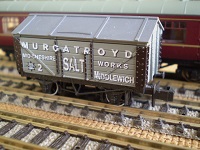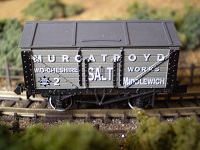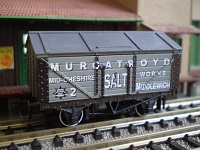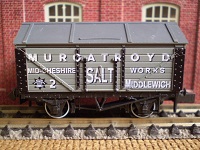The little town of Middlewich lies in mid-Cheshire, some twenty miles east of the city of Chester, and seems an
unlikely place to be the centre of a major industry. Yet for two millenia it has been a major producer of salt,
ever since the invading Romans discovered the area's natural brine pits and founded a settlement which they called
Salinae. Heating the brine to boil off the water left a residue of top-quality natural salt, which was just the job
for flavouring and preserving food.
Salt production thrived down the centuries, and by the Victorian era it had gone
industrial. The main producers weren't keen on market forces making the price go up and down, and in 1888 they
decided to make life easier for themselves by banding together into a price-fixing cartel called the Salt Union.Good
news for them but not so good for their customers, one of whom was Manchester-based engineer & businessman George
Murgatroyd. He saw an opportunity for independent producers to muscle in on the lucrative salt market by
undercutting the Salt Union's fixed prices, so he bought some land on the edge of Middlewich and had his men
sink an exploratory well. They struck brine, and in 1889 the Murgatroyd Mid-Cheshire Salt Works Company opened for
business. In 1893 an ammonia-soda plant was constructed at their Brooks Lane site, and over the next few decades
the business went from strength to strength. The works was handily located right next to the LNWR's branchline from
Sandbach to Northwich, so the finished salt could easily be sent out by rail, and like most companies of the era
Murgatroyd's had a fleet of their own wagons to carry their goods to the customers.
Salt needs protecting from the
elements whilst it's in transit, and Murgatroyd's carried their salt safely in the wooden-bodied pitch-roofed
vans synonymous with the industry. They would have been seen anywhere on the UK rail system during the steam railway
era, even after nationalisation. But time caught up with them in the end, of course, like it caught up with George
Murgatroyd's company. It was taken over in the 1950s by bigger fish, and is now owned by the oil giant BP. The
Brooks Lane salt works closed in 1966, although the brine pump continued to operate to supply other sites until 1977.
The works became derelict and looked set for demolition, until it was recognised that the well-preserved machinery
represented a milestone in the area's industrial heritage. Funding was found for the site to be preserved and
restored, and George Murgatroyd's pioneering work of 130 years ago is being saved for posterity.
Bring the spirit of George to life on your layout with our Murgatroyd's salt wagon.
To buy this wagon along with our Manchester Ship Canal brake van, please go to our 'N' Sets page.
|









